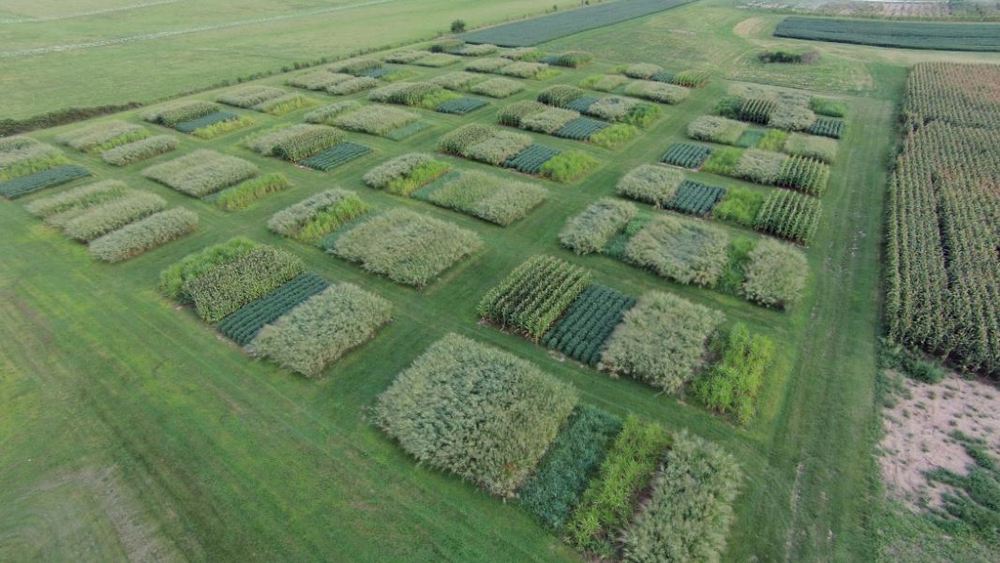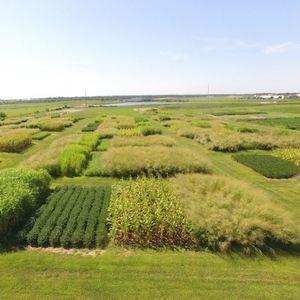Switchgrass may be option for farmers who have lost topsoil










University of Missouri
December 16, 2016
BY University of Missouri
The loss of fertile topsoil from agricultural fields is an economic problem for modern farmers. When runoff water washes topsoil from agricultural fields in areas with claypan soils under the topsoil, including parts of Missouri, Iowa, Kansas, Illinois, Oklahoma and Texas, farmers are often left with an exposed subsoil clay layer that creates difficult conditions for growing crops. Now, a study from the University of Missouri College of Agriculture, Food and Natural Resources has found that switchgrass, which is a perennial plant and used commonly for biofuel, improves soil quality and can be grown on farms that have lost fertile topsoil. Stephen Anderson, the William A. Albrecht Distinguished Professor of Soil Science at MU, says that switchgrass may be a good option for farmers who have challenges with growing other crops, provided a good market is available for switchgrass.
“Once a farm loses its topsoil due to erosion, the soil recovers very slowly,” Anderson said. “Switchgrass can be grown efficiently on eroded claypan soils; farmers who have lost their topsoil may want to consider growing this hardy plant. Switchgrass can be harvested and sold as a biomass crop for ethanol production or as fuel for power plants. While demand depends on the current market for biomass crops, this could be an answer for these farmers who otherwise have challenges obtaining good economic returns growing grain crops on eroded land.”
Advertisement
Advertisement
For their study, Anderson and lead author Syaharudin Zaibon, a doctoral candidate at MU, examined farming plots with varying levels of topsoil, which were established in 2009. Each plot had varying amounts of topsoil ranging from extra topsoil to no topsoil. Corn, soybeans and switchgrass were grown on each plot, and after five years, the researchers examined the soil density and water permeability of each plot. They found that the switchgrass had improved the soil quality of the plots with little or no topsoil on which it grew.
“Claypan layers have lower water permeability, making it more difficult for plants to receive water and for farmers to obtain good economic returns from grain crops when the silt loam topsoil is lost from these areas,” Anderson said. “This lower permeability prevents oxygen and water from seeping into the eroded soil. We found that over a number of years, the switchgrass was able to increase, or improve, the water permeability into this eroded soil, leading to an 11 percent higher water saturation than the areas where corn and soybeans were grown. This study shows that not only can switchgrass grow in these eroded claypan soil areas, but it actually can improve the soil over time, potentially opening the door for better production of grain crops subsequently grown in those areas.”
Advertisement
Advertisement
This study was published in the Soil Science Society of America Journal. Additional authors include Newell Kitchen, soil scientist with the USDA-ARS Cropping Systems and Water Quality Unit and an adjunct professor at MU, and Samuel Haruna, a doctoral student at MU.
Related Stories
The U.S. Department of Energy Bioenergy Technologies Office (BETO) announced up to $23 million in funding to support research and development (R&D) of domestic chemicals and fuels from biomass and waste resources.
The U.S. DOE has announced its intent to issue funding to support high-impact research and development (R&D) projects in two priority areas: sustainable propane and renewable chemicals and algal system cultivation and preprocessing.
Sens. Sherrod Brown, D-Ohio, and Pete Ricketts, R-Neb., in August introduced the Renewable Chemicals Act, a bill that aims to create a tax credit to support the production of biobased chemicals.
The Chemical Catalysis for Bioenergy Consortium, a consortium of the U.S. DOE’s Bioenergy Technologies Office, has launched an effort that aims to gather community input on the development of new biomass processing facilities.
USDA on March 8 celebrated the second annual National Biobased Products Day, a celebration to raise public awareness of biobased products, their benefits and their contributions to the U.S. economy and rural communities.
Upcoming Events










